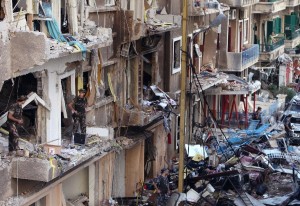 Syria was probably involved in a Beirut car bombing that killed internal security chief General Wissam al-Hassan, French Foreign Minister Laurent Fabius said on Sunday.
Syria was probably involved in a Beirut car bombing that killed internal security chief General Wissam al-Hassan, French Foreign Minister Laurent Fabius said on Sunday.
“It is likely…. Everything indicates that this is an extension of the Syrian tragedy,” Fabius told French television, accusing Syrian President Bashar al-Assad of spreading the conflict in his own country.
“I wish to express how much we condemn this dreadful attack, how much we are in solidarity with the Libyan people and government,” Fabius said.
He called Assad a “manipulator” who wanted to spread the “contagion to Turkey, Jordan and Lebanon.”
Ghassan al-Azzi, a politics professor at Beirut’s Lebanese University, said on Saturday that “Hassan was targeted daily by pro-Syrian newspapers in Lebanon and Damascus accused him of aiding rebels hostile to (President) Bashar al-Assad.”
“Damascus detested him above all for catching red-handed with explosives Lebanon’s former information minister Michel Samaha, the most pro-Syrian of Syria’s allies,” he added.
Hassan arrested Samaha at his home in August and police found explosives which investigators alleged were to be used in a series of attacks in northern Lebanon to spark unrest in the country.
A series of deadly sectarian clashes between pro- and anti-Damascus gunmen in the northern city of Tripoli in the summer raised fears that the Syrian conflict was spilling over into Lebanon.
The meticulousness with which Hassan’s assassination was planned and carried out has led to suspicions that his killers were professionals belonging to a state security apparatus.
“It’s a war between the (Lebanese and Syrian) security services,” said Fadia Kiwane, director of political science at Saint Joseph University in Beirut.
“Hassan had spearheaded the confrontation with the Syrian regime since the assassination of prime minister Rafiq Hariri” who was killed in 2005 in a car bombing also blamed on Syria despite its repeated denials.
“The Syrian regime remained in Lebanon for 35 years, it infiltrated all levels of the administration, and is present in all local governments,” she added, referring to Syria’s political and military domination of its neighbor.
The Syrian army withdrew from Lebanon in 2005 after an almost 30-year occupation.
General Ashraf Rifi, head of Lebanon’s Internal Security Forces (ISF), said that Hassan had only arrived back in the country the evening before his assassination.
“No one, not even me, knew when he was getting back from Paris,” he told journalists. “I never asked about his movements for security reasons.”
Hassan was travelling in an unmarked car and his assassins would have had to be well-informed of his plans to wait for him and detonate the car bomb in a narrow street.
Al Arabiya

Leave a Reply
You must be logged in to post a comment.